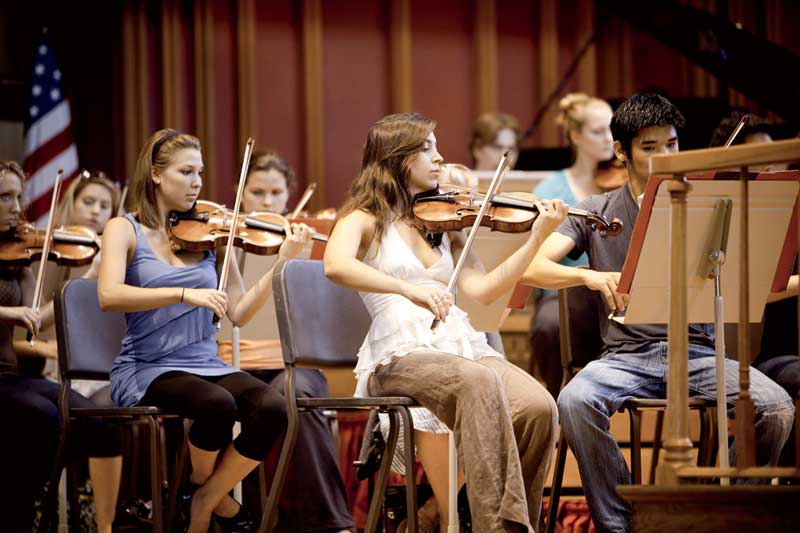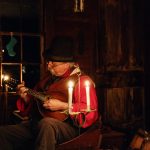Touching the Dream at Tanglewood
If you’re a young, talented musician and aspire to join a symphony orchestra one day, there’s one place where you want to summer. On a humid afternoon in late June, I’m walking across Tanglewood’s manicured grounds with a young violinist named Tema Watstein. She has long, dark hair and wears sandals and blue jeans, a […]

Coffee By Design | Portland, Maine
Photo Credit : Katherine KeenanIf you’re a young, talented musician and aspire to join a symphony orchestra one day, there’s one place where you want to summer.
On a humid afternoon in late June, I’m walking across Tanglewood’s manicured grounds with a young violinist named Tema Watstein. She has long, dark hair and wears sandals and blue jeans, a scarf draped over her T-shirt. She appears relaxed and down to earth in this lofty setting. Tanglewood, in Lenox, Massachusetts, is most widely known as the Berkshires summer home of the Boston Symphony Orchestra, with its season-long festival of classical concerts. But there’s another part of Tanglewood: the Tanglewood Music Center, known by arts insiders around the world as a preeminent summer institute for emerging professional musicians.
The center was founded 71 years ago by the legendary Russian-born conductor Serge Koussevitzky. One of Koussevitzky’s early students was Leonard Bernstein, who would later return to help develop the center’s programs along with Aaron Copland. Twenty percent of today’s American symphony orchestra musicians are graduates of the program. Among them are composers John Adams, Lukas Foss, Oliver Knussen, and Burt Bacharach; conductor (and former BSO music director) Seiji Ozawa; soprano Dawn Upshaw; jazz and classical trumpeter/composer Wynton Marsalis; and dozens of other familiar names, many of whom also return as regular and guest faculty. As Tema leads me on the winding path past the Koussevitzky Music Shed, these are the footsteps she’s walking in.
Tema is one of 157 instrumentalists, singers, and composers who have earned the privilege of studying and performing with the very best at the Tanglewood Music Center this summer. These “Fellows,” chosen from more than 1,500 applicants, come from 21 countries and 51 schools–from Juilliard, the New England Conservatory, the Peabody Institute–the strongest programs in the land. A 2010 graduate of Rice University in Texas, Tema would seem to represent the program’s reach and national stature. But she in fact represents something closer to home.
Tema grew up in North Haven, Connecticut. Her parents have a summer place in Monterey, just down the road from Lenox. For as long as she can remember, Tema spent summers practicing the violin and coming to concerts at Tanglewood. She watched the Boston Symphony Orchestra perform so many times that she could recognize several of its members by sight.
While at Choate Rosemary Hall, enjoying a growing local and regional reputation, Tema soloed with professional orchestras and continued her studies under a former Tanglewood Fellow named Wendy Sharp. She watched her most accomplished older schoolmates return from college and perform here. She is modest and speaks matter-of-factly, though she has a deeper understanding of the place’s history than do most other Fellows. She tells me that she’d dreamed of one day being up there on the stage herself.
In 2009 she got her chance. As a junior at Rice, she’d nailed a difficult audition in Houston, impressively performing both orchestral and chamber pieces, a standard concerto, a Mozart concerto, and excerpts from the upcoming Tanglewood season. Her acceptance put her at the younger end of the class. She marveled at the opportunity she’d been given. In her first public performance in the Shed–the long and complicated Act III of Wagner’s classic opera Die Meistersinger von Nüuernberg–her stand partner was Raymond Gniewek, retired concertmaster of New York’s Metropolitan Opera Orchestra. And then Tema was invited to return for a second season.
We walk to a small hut tucked in the forest. The wood-sided building–simple, high-ceilinged, airy–might be mistaken for a camp, except for the grand piano and the folding chairs and music stands clustered about, and the great acoustics. Tema tells me there are several of these intimate practice spaces scattered here and there across the grounds, all with names like “Hickory” and “Birch” and “Maple.” They’re among her favorite places. This idyllic, natural setting is part of the magic of Tanglewood, but the Fellows’ seven-day-a-week schedule of rehearsals, practice, and master classes is intense.
Tema had started her day, as she does every day, waking up in a dorm room at Miss Hall’s School, a private girls’ academy about seven miles north in Pittsfield, and warming up for a half-hour before catching a shuttle bus to Tanglewood. Most days she’s on the grounds from 8 a.m. to 10 p.m.: three hours of orchestra rehearsal in Seiji Ozawa Hall; a couple of hours of chamber practice in “Hickory” or “Birch”; a master class on Bach sonatas, perhaps, or on concertmaster solos, or on orchestra administration; then focused practice on her own; and finally another big orchestral rehearsal or performance in the evening.
As a Tanglewood Fellow, Tema often plays alongside members of the BSO–the same musicians she once watched as a dreaming high-school student. Tonight the Mark Morris Dance Group is in residence, and Tema will get to join the members in their warm-ups and learn a bit about their process before she performs the music that will accompany their program. The education at Tanglewood is an immersion in the arts.
She has some practicing to do before then, and should somehow squeeze a meal in besides. But she asks me whether I have time to go over and see the inside of Ozawa Hall. She has the ease of someone who is where she wants to be–and a sense of where she’s headed. “It’s beautiful,” she says.
To view Tanglewood’s 2011 schedule, visit: bso.org. Read a “Yankee Classic” story on picnicking at Tanglewood.







